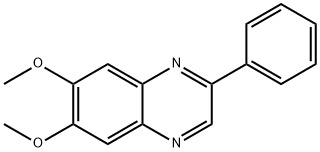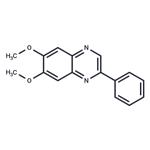Protein tyrosine kinase (PTK) inhibitors are potential antiproliferative agents for diseases caused by the hyperactivity of PTKs. Tyrphostins are a class of antiproliferative compounds which act as PTK blockers. PTK inhibitors specific for platelet-derived growth factor (PDGF) receptor kinase could help in the treatment of atherosclerosis, restenosis, pulmonary fibrosis, and gliomas. AG-1296 is a potent and selective inhibitor of PDGF receptor kinase with an IC50 value of about 0.4 μM both in vitro and in cells (Swiss 3T3 cells). It inhibits ligand-stimulated DNA synthesis in platelet-derived growth factor receptor and stem cell factor/kit receptor transfected cells with an IC50 values of 1.5 and 1.8 μM, respectively. Treatment of sis oncogene transfected NIH3T3 cells with AG-1296 reverses the transformed phenotype.
Tyrphostin AG 1296, is the platelet-derived growth factor receptor (PDGFR) inhibitor, which can causes growth inhibition in glioblastoma cells.
ChEBI: 6,7-dimethoxy-2-phenylquinoxaline is a quinoxaline derivative.
1) Kovalenko et al. (1997), Phosphorylation site-specific inhibition of platelet-derived growth factor beta-receptor autophosphorylation by the receptor blocking tyrphostin AG1296; Biochemistry, 36 6260
2) Krystal et al. (1997), Induction of apoptosis and inhibition of small cell lung cancer growth by the quinoxaline tyrphostins; Cancer Res., 57 220
3) Strutz et al. (2001), TGF-beta 1 induces proliferation in human renal fibroblasts via induction of basic fibroblast growth factor (FGF-2); Kidney Int., 59 579


